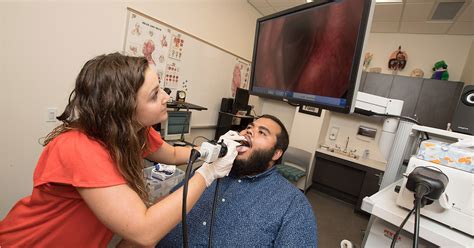Are you passionate about helping others communicate effectively and improve their speech? Are you interested in pursuing a career in speech-language pathology? Look no further! In this blog post, we will explore the exciting field of speech-language pathology and the top programs offered by universities in the United States.
Speech-language pathology is a rewarding and in-demand field that focuses on diagnosing and treating speech and language disorders. Speech-language pathologists play a crucial role in helping people of all ages overcome communication challenges and improve their quality of life.
In this post, we will delve into the importance of speech-language pathology programs and the top universities in the US that offer these programs. We will also discuss admission requirements, curriculum, research opportunities, clinical training, and financial aid options available for aspiring speech-language pathologists. Additionally, we will highlight the promising career prospects and success stories of graduates in the field. Whether you’re a prospective student or simply curious about the field, this post will provide valuable insights into the world of speech-language pathology programs. Stay tuned!
Table of Contents
Overview of Speech-Language Pathology
Speech-Language Pathology is a field of study that focuses on the diagnosis, treatment, and prevention of communication and swallowing disorders. It encompasses a wide range of issues, including speech disorders, language disorders, and cognitive-communication disorders. Speech-language pathologists work with individuals of all ages, from infants to the elderly, and can specialize in areas such as pediatric speech therapy, adult neurogenic disorders, and voice disorders.
One of the key roles of Speech-Language Pathologists (SLPs) is to assess and develop treatment plans for individuals with communication and swallowing disorders. They use a variety of techniques and tools to help improve their clients’ abilities to communicate effectively and safely. SLPs also work closely with other healthcare professionals, educators, and family members to coordinate care and provide support for their clients.
In addition to clinical work, SLPs may also be involved in research to advance the understanding of communication and swallowing disorders. They contribute to the development of new assessment tools, treatment approaches, and technologies that can improve the lives of individuals with these disorders. Research in the field of speech-language pathology is crucial for advancing the quality of care and expanding the knowledge base about communication and swallowing disorders.
Overall, the field of speech-language pathology plays an essential role in helping individuals overcome communication and swallowing challenges, and it offers a rewarding and diverse career path for those interested in making a difference in the lives of others.
Importance of Speech-Language Pathology Programs
Speech-language pathology programs play a crucial role in addressing communication and swallowing disorders in individuals of all ages. These programs are vitally important in helping people overcome speech and language difficulties, allowing them to communicate effectively and participate fully in social, educational, and professional settings.
By providing specialized training and education, speech-language pathology programs equip students with the knowledge and skills to assess, diagnose, and treat a wide range of communication disorders. This is essential in improving the quality of life for individuals with speech and language challenges.
Furthermore, speech-language pathology programs contribute to ongoing research and advancements in the field, leading to the development of innovative techniques and interventions that enhance therapy outcomes. This focus on research and evidence-based practices ensures that individuals receive the most effective and up-to-date treatment for their communication and swallowing needs.
Ultimately, the importance of speech-language pathology programs cannot be overstated, as they serve as the foundation for professionals dedicated to making a meaningful impact on the lives of those with communication and swallowing disorders.
Top US Universities Offering Speech-Language Pathology Programs
When it comes to pursuing a career in speech-language pathology, choosing the right university is crucial. Fortunately, the United States is home to several top-notch universities that offer exceptional programs in this field.
One such university is the University of Iowa, which is renowned for its strong commitment to research and education in speech-language pathology. Their program provides students with comprehensive theoretical knowledge and practical skills, preparing them for a successful career in this field.
Another top university offering speech-language pathology programs is Vanderbilt University in Nashville, Tennessee. With access to cutting-edge resources and facilities, students at Vanderbilt receive a well-rounded education that prepares them for the diverse challenges of the field.
Northwestern University in Evanston, Illinois is also widely recognized for its speech-language pathology program. Students benefit from the university’s strong emphasis on clinical experience and practical training, gaining valuable hands-on skills that are essential for success in the field.
Admission Requirements for Speech-Language Pathology Programs
When it comes to pursuing a career in speech-language pathology, it is important to be aware of the admission requirements for the programs offered at various universities. Aspiring speech-language pathologists must meet certain criteria in order to be considered for admission into these programs.
Undergraduate Degree: One of the common admission requirements for speech-language pathology programs is having a bachelor’s degree in communication sciences and disorders or a related field. Some programs may also accept students with a bachelor’s degree in a different major, provided they have completed prerequisite courses in speech-language pathology.
Grade Point Average (GPA): Applicants are generally required to have a minimum GPA of 3.0 on a 4.0 scale. However, some universities may have specific GPA requirements for their speech-language pathology programs, so it is important to check the individual program’s admission criteria.
Letters of Recommendation: Most speech-language pathology programs require applicants to submit letters of recommendation from professors, supervisors, or professionals who can speak to the applicant’s academic abilities and potential in the field. These letters are an important part of the application package and should be carefully chosen to showcase the applicant’s skills and qualifications.
Standardized Test Scores: Many programs require applicants to submit scores from the GRE (Graduate Record Examination). Some programs may also have specific score requirements, so it is advisable for prospective students to prepare for and take the GRE well in advance of the application deadline.
Curriculum and Coursework in Speech-Language Pathology Programs
When pursuing a degree in Speech-Language Pathology, students can expect to encounter a comprehensive curriculum that covers a wide range of topics related to communication disorders. The coursework is designed to provide students with the necessary knowledge and skills to assess, diagnose, and treat individuals with speech and language impairments.
Students will typically take foundational courses in linguistics, anatomy and physiology of the speech and hearing mechanisms, and normal speech and language development. These courses provide a strong theoretical foundation for understanding communication disorders and the underlying physiological and cognitive processes involved.
In addition to foundational courses, students will also engage in specialized coursework that delves into the assessment and treatment of specific communication disorders, such as stuttering, voice disorders, and aphasia. This coursework allows students to develop expertise in diagnosing and treating a variety of speech and language impairments.
Furthermore, many programs incorporate clinical practicum experiences into the curriculum, providing students with opportunities to apply their knowledge and skills in real-world settings under the supervision of experienced professionals. These practical experiences are invaluable for students as they work towards becoming competent and confident speech-language pathologists.
Research Opportunities in Speech-Language Pathology Programs
Research opportunities in speech-language pathology programs offer students the chance to delve into cutting-edge research that can shape the future of the field. These opportunities provide students with hands-on experience in conducting research, collaborating with faculty and peers, and contributing to the advancement of knowledge in speech-language pathology.
Students in speech-language pathology programs can engage in research on a variety of topics, such as language development, communication disorders, neurogenic speech and language disorders, and voice disorders. Research opportunities often include working in state-of-the-art laboratories, conducting experiments, analyzing data, and assisting faculty members with their research projects.
Participating in research in speech-language pathology programs not only enhances students’ academic experience but also prepares them for careers in research, academia, or clinical practice. It allows students to develop critical thinking, analytical, and problem-solving skills that are essential in advancing the field of speech-language pathology.
Moreover, research opportunities in speech-language pathology programs can lead to publication in academic journals, presentations at conferences, and networking with professionals in the field. This exposure can open doors to further research opportunities, collaborations, and potential employment in research institutions, healthcare facilities, and academic settings.
Clinical Training and Fieldwork in Speech-Language Pathology Programs
Clinical training and fieldwork are essential components of speech-language pathology programs, providing students with hands-on experience and the opportunity to apply their knowledge in real-world settings. This practical training is crucial for preparing future speech-language pathologists to work effectively with individuals of all ages who have communication and swallowing disorders.
Students in these programs typically engage in clinical practicum experiences, which involve working under the supervision of licensed speech-language pathologists in a variety of settings, such as hospitals, schools, clinics, and rehabilitation centers. This allows them to gain exposure to diverse patient populations and develop their clinical skills in assessment, intervention, and documentation.
Fieldwork experiences in speech-language pathology programs often involve longer, more intensive placements in specific clinical settings, where students have the opportunity to apply their knowledge and skills to address the needs of individuals with communication and swallowing difficulties. These experiences provide valuable insights into the daily challenges and rewards of working in the field, helping students to solidify their career goals and aspirations.
Overall, clinical training and fieldwork play a crucial role in shaping the future practitioners of speech-language pathology, providing them with the practical experience and confidence needed to make a positive impact on the lives of those they will serve.
Scholarships and Financial Aid for Speech-Language Pathology Programs
Attending a speech-language pathology program can be a significant financial investment, but there are various scholarships and financial aid options available to help alleviate the cost for students pursuing this field. Scholarships are a great way for students to receive financial assistance based on academic achievement, financial need, or specific talents. Many universities and professional organizations offer scholarships specifically for students studying speech-language pathology.
Financial aid may also be available in the form of grants, loans, or work-study programs. It’s important for students to research and apply for as many opportunities as possible to help finance their education in this specialized field.
In addition to scholarships and financial aid from universities and organizations, students may also explore options such as federal student aid, private loans, and part-time employment. Understanding the variety of financial resources available can help students make informed decisions about how to fund their education in speech-language pathology.
Overall, the availability of scholarships and financial aid for speech-language pathology programs can make pursuing this rewarding career more accessible to a diverse range of students who are passionate about helping others improve their communication skills and quality of life.
Career Prospects for Speech-Language Pathologists
Speech-language pathologists have excellent career prospects in today’s rapidly growing healthcare industry. As the demand for professionals in this field continues to rise, individuals with the proper education and experience can look forward to a rewarding and stable career.
With the increasing awareness of communication disorders and the impact they have on individuals’ quality of life, the need for speech-language pathologists is expected to grow significantly in the coming years. This demand is driven by factors such as an aging population, a rise in the diagnosis of speech and language disorders, and a greater emphasis on early detection and intervention.
Graduates of speech-language pathology programs can pursue careers in a variety of settings, including hospitals, clinics, schools, rehabilitation centers, and private practice. They can work with individuals of all ages, from infants to the elderly, and across a wide range of communication and swallowing disorders.
Furthermore, speech-language pathologists have opportunities for advancement and specialization within their field, with options to focus on specific populations, such as children with autism or adults recovering from strokes, or to take on supervisory or administrative roles.
Success Stories of Speech-Language Pathology Graduates
After completing their rigorous and comprehensive education in Speech-Language Pathology programs, graduates enter the professional world equipped with the knowledge and skills necessary to make a positive impact on the lives of individuals with communication disorders. These success stories showcase the diverse career paths and achievements of speech-language pathology graduates, inspiring current students and aspiring professionals in the field.
One success story involves a graduate who pursued a career in pediatric speech therapy and eventually opened her own private practice, specializing in early intervention for children with speech and language delays. Her dedication and passion for helping young patients communicate effectively have made her a respected and influential figure in her local community.
Another graduate found success in the field of adult neurological rehabilitation, working with individuals who have experienced strokes or traumatic brain injuries. Through her innovative treatment approaches and commitment to ongoing professional development, she has been able to significantly improve the communication abilities and quality of life for her clients.
Other speech-language pathology graduates have gone on to pursue careers in academia, contributing to the advancement of research and knowledge in the field. Their work as professors and researchers has led to important discoveries and developments in the diagnosis and treatment of communication disorders, benefiting both current and future generations of patients.






